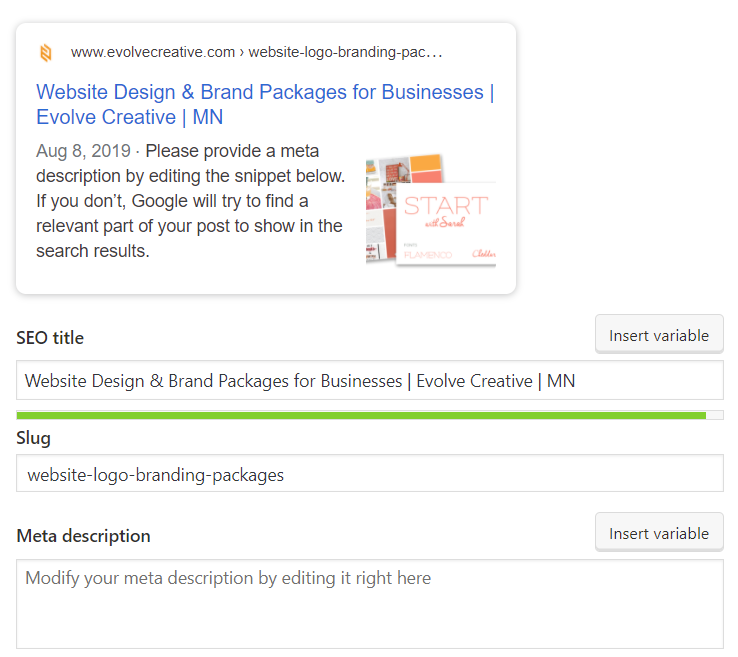
What's SEO?
Search Engine Optimization (SEO) is the process of improving your website to increase visibility and traffic for relevant searches on browsers like Google or Bing.
If you select Evolve Creative to design and develop your website, we truly take care of all the heavy lifting to make certain your site has top notch organic SEO including: coding, page titles, keyword research, permalinks and image optimization. But how can you continue to ensure you have good SEO after the site is launched and you continue to add new content or products? There are many factors that go into a good SEO, but two of the most important elements are page titles and keywords.
Title Tags (Page Titles)
One of the most important elements in SEO is actually found in the title tags, also called page titles. A title tag is an HTML element that specifies the title of a web page and provides a clickable link within your search engine. Their intention is to describe what's on the page and are a very important element in determining your search engine rank.

Your title tags should draw attention and intrigue. Words like “Best, Affordable, and Quality” are good ways to spark interest. Evoking a thought can also get a user invested enough to click on your link—try incorporating words like “What, Who, How, etc.” to make a reader want to know more. Best part, the title tags are not actually visible from the front-end of the site. Hence why many people modify their title tag accordingly in order to perform well in search engines.
How To Add or Edit
If you're site is built in WordPress then you can install the Yoast SEO or The SEO Framework plugin. After install you should see a new toggleable area under your content editor on all pages and posts called “Yoast SEO”. Here you can enter new title tags in the "SEO Title" section, or use the auto populated tags that were created from the title of your page/post, along with the website title.

How to write a good Title Tag
- Watch your title length. A good rule of thumb when creating title tags is using 60-70 characters max. Once a title tag becomes too long, search engines will by default replace text with the unsightly "..." creating missed opportunity. Additionally, try not to make your title tags too similar. Having specific keywords that represent the content within that particular page will convert visitors faster.
- Don't overdue SEO keywords. You will want to avoid titles that are simply a list of keywords that are repeated variations or misleading keywords. Trying to trick search engines can lead to unfavorable rankings from browsers. This practice, also known as keyword stuffing, includes things like listing multiple locations or irrelevant information, and doesn’t fit well within most browser guidelines. see Google’s Webmaster Guidelines for more information.
- Put important keywords first. According to Moz's testing and experience, keywords closer to the beginning of your title tag may have more impact on search rankings. In addition, user experience research shows that people may scan as few as the first two words of a headline. So describe what's on your page.
- Take advantage of your unique selling proposition (USP). Use keywords that leverage your unique selling proposition - those that are specific to your target audience, explain the benefits of your product or service, and what problem they can help solve. Just make sure you don't create duplicate titles.
- Write for your customers. Even while title tags are very important to your SEO, your number one priority is to use title tags to attract clicks from your target audience who are likely to find value in your content.
Keywords
An equally vital part of an SEO, is keywords. These can be a single word or a short phrase, and will be used by browsers to match search queries with relevant websites. To select a good keyword, you should consider what your target audience will be searching for, and how you’d like to be discovered. The more specific you can make your keyword, the better. It’s common for users to refine their searches as they browse, and make increasingly specific queries to find what they want. “Furniture stores” becomes “reclining sofa store near me” which becomes “black leather reclining sofa MN.”
To improve your keywords, it’s important to understand the language of your clients, and what searches they’ll be making. The more focused your keyword becomes, the more traffic you can attract. Check out the Google Keywords Planner. It's a great free tool to research and discover new keywords related to your business and see estimates of the searches they receive. You will, however, need to have a Google Ads account. You can set one up HERE for free!

Helpful SEO Resources
If you’re looking for ways to revise and improve your SEO, there are lots of easy solutions available! The Yoast plugin for WordPress (FREE) or all the great advanced SEO tools Wix offers (FREE). The SEMrush Site Audit (PAID) is another great resources that can help revitalize your SEO, and start generating more traffic and rankings into your website today!
Don't miss out on our tips!
Submit your email to receive the latest tips & tricks to help your business succeed!
